Breadcrumb navigation
In Conversation with composer Ben Pease Barton & librettist David Bottomley
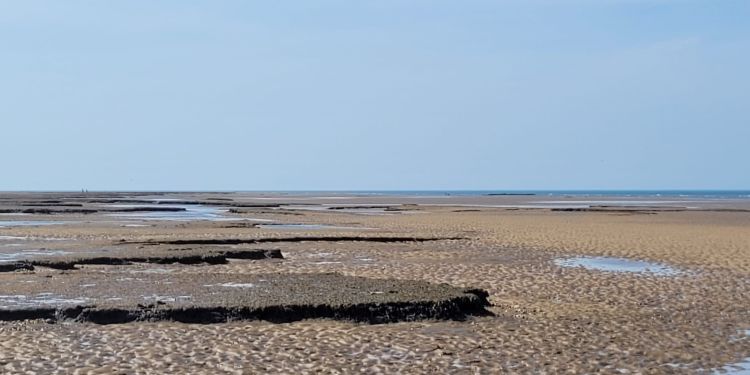
In Conversation with composer Ben Pease Barton & librettist David Bottomley
On Thursday 8 May Guildhall School's most prestigious music prize, The Gold Medal, returns with a concert at Barbican Hall, offering the chance to enjoy songs and arias performed by three outstanding Guildhall vocalists: Manon Ogwen Parry, Redmond Sanders and Seohyun Go.
As part of the evening, Guildhall Symphony Orchestra will perform HOLME - a newly commissioned work by composer Ben Pease Barton, supported by the inaugural Jane Manning – Anthony Payne Award, with text by David Bottomley and featuring current student mezzo-soprano Karima El Demerdasch as soloist.
The Jane Manning – Anthony Payne Award is made biennially to a Guildhall composition student to commission a work for solo voice and orchestra, enabled by a generous bequest from Jane Manning, soprano and former professor, and her husband, composer Anthony Payne.
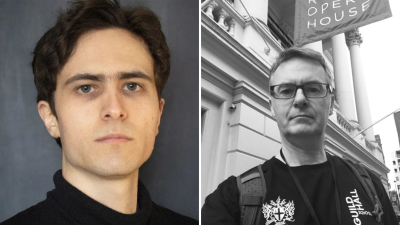
Ahead of the performance we caught up with Ben and David (both pictured above) to find out more about the piece and their inspiration behind it.
How did your creative partnership come about, and what was the process of shaping HOLME together like?
BEN: David and I met as postgraduate students at Guildhall, while I was on the composition programme, and he was a librettist on the MA in Opera Making and Writing course. We stayed in touch after graduating with a view to collaborating. I felt David would be the perfect fit for this commission since I wanted to centre the piece around ideas of landscape and ecology, and these are prominent themes in David’s work. The challenge for us, however, was finding a central concept that could provide a clear dramatic shape for a ten-minute piece.
After much toing and froing, David stumbled across a remarkable 2024 paper by archaeologist Dr David Nance. This presented new research around the prehistoric timber monument Holme I (pronounced ‘home’, also known as ‘Seahenge’), formerly of Holme Dunes Nature Reserve, Norfolk. Nance has proposed that its construction was a ritualistic means of reversing climate change during a global cooling event. I was immediately interested; for me, this was the perfect combination of something enigmatic – almost otherworldly – and yet strikingly resonant with our own times.
DAVID: Ben asked if I would be interested in writing a landscape piece for the Jane Manning – Anthony Payne Award and commissioned me to write the text. Based on our mutual interest, I felt the ancient site of ‘Seahenge’ offered something special for both of us.
It was a very collaborative process. We sent each other musical, literary links and imagery as mood board inspiration. I sent Ben my background research material and photographs of the site first to conjure the atmosphere of the place followed by my initial sketches of texts. Then it was a process of back and forth, eliminating a couple of stanzas for duration and distilling our favourite imagery and rhythms to facilitate Ben’s precise ideas for two contrasting sections in the composition.
What first sparked the idea for HOLME?
DAVID: When Ben and I first discussed the project, he floated the theme of the fragility of landscape encompassing a sense of loss, of ancient landscapes shaped by humans. This chimed with my work in eco-poetry and psychogeography, about the layering of history in landscape and divining the ancient spirit of land, its people and myth. I thought of the atmospheric potential of ‘Seahenge’ for evoking music, an ancient Early Bronze Age elliptical timber monument originally built on marshland but rediscovered at low tide buried in shifting sands at Holme beach in North Norfolk, in 1998. But what really lit the touch paper for me was discovering the recent article by Dr David Nance on his extraordinary interpretation of the wooden structure built by ancient tribes in 2049BC as a monument in a bid to reverse the cold climate change by the ritual of Penning the Cuckoo.
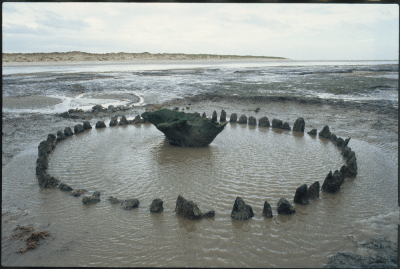
BEN: Manning is Norwich born and bred, she and Payne married in Norfolk, and Payne was a Professorial Fellow at the University of East Anglia. Since I partly grew up in Norwich, David and I thought it fitting to draw inspiration from a Norfolk landscape. That’s how David’s idea to look to ‘Seahenge’/Holme I for inspiration first emerged.
The word HOLME carries several layers of meaning. What does it represent for you?
BEN: Yes, there are several layers! There’s ‘Holme’ the placename and its namesake monument (a word which originates from the Old English ‘Holm’, meaning ‘sea’ or ‘island’). But there’s also the idea that, according to Nance’s proposal, ‘home’ for Holme’s Early Broze Age inhabitants was as under threat climactically as our global ‘home’ is today. The parallels between a ritualistic (and ultimately futile) attempt to reverse climate change in 2049BC, and contemporary civilisation’s arguably insufficient response to global warming, are as striking as they are ominous. Since Norfolk was Jane Manning’s home county, HOLME seemed the perfect title.
DAVID: For me, it is the connection to an ancient tribe of people who created an extraordinary monument in the landscape and the mystery of its construction. How it might have come about through their desperation to defeat climate change to preserve their crops, therefore their existence, and what was home to them in this bleak marshland four thousand years ago.
How would you describe the musical world of HOLME - what can audiences expect to hear and feel?
BEN: I like to think that the music goes on a journey. Things start very still and intimate as David’s words depict a wintry sea mist drifting over the vast mudflats at Holme. It’s a very stark and somewhat eerie landscape, but punctuated by life and colour, whether that be a passing gaggle of geese, darting sanderlings, lapping waves, or glinting frost adorning desiccated mud cracks. The first half of the piece is very mercurial. However, as David’s text describes the determined (and likely somewhat desperate) construction of the prehistoric monument, the music becomes increasingly rhythmic, driven and tumultuous.
Guildhall mezzo soprano Karima El Demerdasch premieres the role in this performance. What drew you to her as the voice of HOLME?
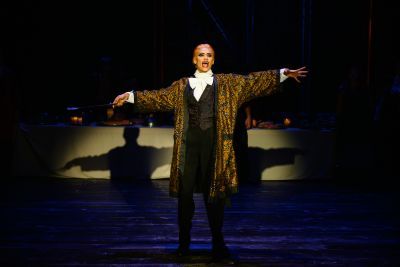
BEN: The huge range and variety of colours Karima’s voice has were ideal for the dramatic poetic and musical world David and I had in mind. Karima is a coloratura specialist which means she can sing fast, virtuosic lines. This is put to use in the climax towards the end of the piece, but also in the somewhat capricious first half, as her part switches rapidly between the slow and lyrical, and the fast and disjunct. But most importantly, Karima is a joy to work with – one of those rare performers who is completely invested in ‘telling the story’ of a piece, not merely reproducing the dots on the page.
This is the first commission under the Jane Manning – Anthony Payne Award. How has their legacy influenced you and this piece?
DAVID: I first encountered Anthony Payne as the composer who finally gave voice to Elgar’s tantalising sketches for his unfinished Third Symphony. It was one of the first pieces I heard at The Proms when I moved to London. For me, it was the culmination of a puzzle that had started as a young teenager on a family visit to Elgar’s birthplace in Malvern, where I bought a postcard with a bar or two of motif from his Third Symphony. I never imagined I would live to hear it so brilliantly realised. The nation owes Payne a huge debt of gratitude for this remarkable selfless act alone.
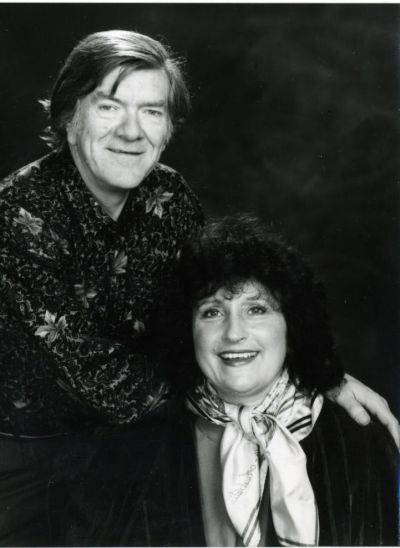
BEN: Manning’s was a legendary voice that shaped the repertoire of contemporary vocal music as we know it today. Her books on the voice are pretty much essential literature for young composers, and I’ve learnt a great deal from them over the years. Anthony Payne was a wonderful composer-musicologist for whom landscape was a frequent source of inspiration. The intense, chromatic lyricism of works such as Of Land, Sea and Sky was certainly on my mind when composing HOLME.
Why did you choose to study at Guildhall School?
DAVID: As a playwright and poet, I was drawn to the specific challenge of learning how to write a libretto for a contemporary opera. It was the concept of the MA in Opera Making in mirroring the early 18th-century workshop model of creating chamber operas as a collaborative small scale artform utilising the combined talents of student singers and musicians at the Guildhall that convinced me to apply for the course.
BEN: Guildhall was my first choice for both undergrad and postgrad study. There’s an atmosphere in the School which is hard to put my finger on: a sense of everyone striving for brilliance in what they do, but not in a competitive or self-interested way – instead with an open-minded, generous and collaborative outlook. In the composition department, this is reflected in the unusually broad stylistic diversity among both the staff and students. And because Guildhall is a cross-arts conservatoire, I’ve met and collaborated with artists working in other disciplines, like David.
And are there any specific memories or performances that you had at Guildhall that stand out?
BEN: There are lots of wonderful memories to choose from. But the premiere of my piece Fall (written in collaboration with writer Olivia Bell) at New York’s Carnegie Hall and London’s Milton Court last year was certainly a highlight. The performers – soprano Manon Ogwen Parry, violinist Kryštof Kohout and pianist William Bracken – were superb.
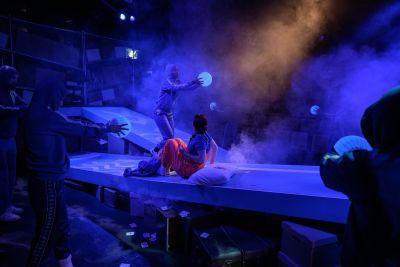
DAVID: It was a special experience to witness the production of my opera, Lanternfish with composer Luka Venter, from initial idea to seeing it fully realised on stage with orchestra, singers, stage and costume design, conducted and directed with great care by professionals.
What has been your career highlight since leaving Guildhall?
DAVID: I would probably say this premiere. The opportunity to be commissioned to write a special work in close collaboration with a composer I respect on such an exciting project for the inaugural Jane Manning – Anthony Payne Award in the Barbican with the Guildhall Symphony Orchestra is really a dream come true.
BEN: I only graduated in November, so this for me too!
What’s one piece of advice you’d give to emerging composers and librettists just starting out?
DAVID: Familiarise yourself with each other’s work and inspiration. Be patient and trust in the creative process – allow a text to evolve and find its final structure. Learn how to compromise and develop a piece together, utilising the composer’s feedback to help shape it ready for their interpretation and setting.
BEN: I’m not qualified to answer that one since I am an ‘emerging composer’! But something I have learnt about myself in recent years is the importance of working outside my comfort zone. Sometimes this has resulted in me writing terrible music, but when you’re young, you can afford to. I think it’s so important not to allow self-consciousness to get in the way of taking risks and embracing the unfamiliar; I find I learn the most that way.
We honour those who pledge their support to Guildhall School in their Will by inviting them to join the 1880 Society. Members of this society help protect the future of Guildhall and the talented students training with us. If you would like to hear more about how you can join the 1880 society, please contact Meg Ryan at meg.ryan@gsmd.ac.uk / 020 3834 1561
